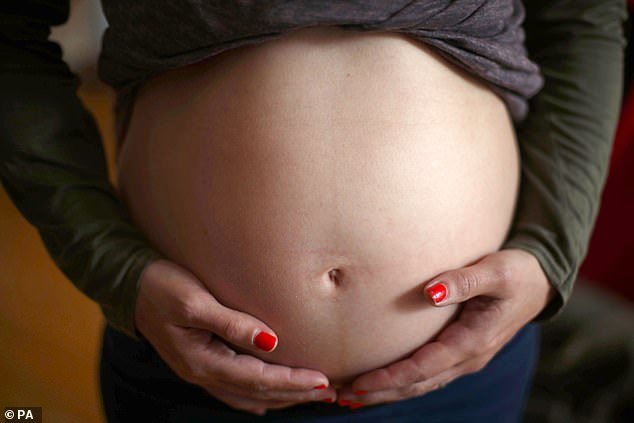GPs have now been told to scrap all planned AstraZeneca vaccine appointments for pregnant women — despite advisers insisting the jab should be safe for mothers-to-be.
A letter sent by NHS England bosses to practices on Saturday specified sites that do not have Pfizer or Moderna vaccines in stock should cancel all scheduled first doses for expectant mothers.
It takes a more precautionary stance than guidance from No10’s vaccine advisory panel issued last week, which stated pregnant women should be offered jabs at the same time as their peers.
Originally the Joint Committee on Vaccination and Immunisation (JCVI) urged all mothers-to-be to hold off getting jabbed until there was more evidence.
But on Friday it concluded they should be offered the Pfizer or Moderna vaccines in the first instance because data from the US showed they were safe.
Medics said it was ‘preferable’ mothers-to-be are offered one of the two jabs instead of AstraZeneca’s because of a lack of data, suggesting that AstraZeneca’s jab should be given if no other alternatives are available at the time.
It said: ‘Woman who are planning pregnancy, are in the immediate postpartum, or are breastfeeding can be vaccinated with any vaccine, depending on their age and clinical risk group.’
But the NHS England letter to practices the following day instructed all practices to direct pregnant women to primary care network sites if they were unable to offer Pfizer or Moderna vaccines themselves.
It said all ‘sites should implement screening procedures to ensure pregnant women are identified and offered the Pfizer BioNtech or Moderna vaccine’.
The letter added that pregnant women who have already had a first dose of AstraZeneca should continue with their second dose as planned, in line with the rest of the population.
NHS England told MailOnline that patients who have their AstraZeneca appointment cancelled would be rebooked instantly for an alternative.
A spokesperson insisted the cancellation policy will not result in pregnant women receiving their first dose later.
because appointments would be transferred at the same time as they are cancelled.
GPs have now been told to cancel all planned AstraZeneca Covid vaccine appointments for pregnant women — despite the JCVI suggesting the jab is safe

Previous guidance said pregnant and breatfeeding women should not be routinely offered any coronavirus vaccine because they weren’t included in clinical trials.
But there has never been any indication that the jabs would be unsafe, which is why health chiefs in the US included them in their vaccine programme.
The JCVI reviewed data from 90,000 pregnant American women given either Pfizer or Moderna’s jab to come to its conclusion.
Expectant mothers are at a greater risk of severe illness or death if they get infected with Covid compared to non-pregnant women of the same age, research suggests.
There are around 850,000 pregnancies per year in England and Wales.
When vaccines for Covid first started to be rolled out, the World Health Organization warned they should should not be used on pregnant women due to lack of evidence about their safety and efficacy.
Later, the body walked back on its advice and said jabs can be administered to expectant mothers safely after more data emerged to show that pregnant women appeared to be more likely to fall very ill with Covid than their peers.
Pregnant women in the US have been able to get the Covid jab at the same time as their peers since last year.
There is no evidence any Covid vaccine has any effect on a woman’s chances of becoming pregnant.
NHS guidance says there is no need to avoid pregnancy after vaccination.
Top UK doctors praised the move from the JCVI, claiming it would ’empower’ pregnant women.
Dr Edward Morris, president of the Royal College of Obstetricians and Gynaecologists (RCOG), said: ‘We are grateful to the JCVI for taking into consideration our evidence and updating the guidance around the Covid vaccine in pregnancy.
‘Vaccination offers pregnant women the best protection from Covid, which can be serious in some women.
‘We believe it should be a woman’s choice whether to have the vaccine or not after considering the benefits and risks and would encourage pregnant women to discuss with a trusted source like their GP, obstetrician or midwife, or a healthcare professional in a vaccination centre.
‘This move will empower all the pregnant women in the UK to make the decision that is right for them, at the same time that the non-pregnant population in their age group receive protection from Covid-19.’
Health chiefs advise women to be extra cautious about Covid if they are pregnant or planning to have a baby, and mothers-to-be are on the ‘clinically vulnerable’ list, but there is not much hard evidence on the specific risks they face.
The Royal College of Obstetricians and Gynaecologists says pregnant women are no more likely to catch Covid than others, and that most have no symptoms or suffer mild cold or flu-like warning signs.
But there are a small number who can become unwell with the virus, and may be at increased risk of becoming severely ill compared to other women.
Some studies have suggested mothers-to-be may be twice as likely to be admitted to intensive care than their non-pregnant peers if they catch Covid.
A range of jabs are already recommended for pregnant women in the UK, including ones for seasonal flu and whooping cough. Medics say the tetanus shot can also be given to those who are expecting if necessary.
